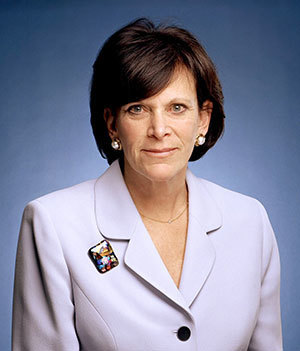 Jessica Tuchman Mathews
Jessica Tuchman Mathews
Jessica Tuchman Mathews, president of the Carnegie Endowment for International Peace, will deliver the 19th annual Rev. Theodore M. Hesburgh, C.S.C., Lecture in Ethics and Public Policy at 4 p.m. April 16 (Tuesday) in the Hesburgh Center Auditorium at the University of Notre Dame.
Mathews’ lecture, “Can America Still Answer to History? What’s Gone Missing and How to Get It Back,” is free and open to the public.
Mathews will address the growing weakness of the United States in the international community, discuss the costs of its diminished role and offer recommendations for strengthening the U.S. government’s position abroad.
Before her 1997 appointment to the Carnegie Endowment, a global think tank with offices in Washington, D.C., Moscow, Beijing, Brussels and Beirut, Mathews served in the executive and legislative branches of government, management and research in the nonprofit arena, and journalism and science policy.
“There is no one more qualified than Jessica Mathews to assess the rapidly shifting international landscape, and to analyze the opportunities as well as the perils confronting the United States in the context of the new globalization,” said Scott Appleby, the John M. Regan Jr. Director of Notre Dame’s Kroc Institute for International Peace Studies.
“Peacebuilders, of course, are hoping that the Obama administration will seize the moment to upgrade the diplomatic corps, strengthen alliances with emerging democracies and engage civil society in devising nonviolent campaigns for constructive social change. Drawing on wide-ranging policy expertise and experience, Dr. Mathews will help us identify the possibilities for renewal of America’s global leadership in these and related areas.”
Mathews was director of the Council on Foreign Relations’ Washington program and a senior fellow from 1994 to 1997. While there, she published her seminal 1997 Foreign Affairs article, “Power Shift,” which chronicles a shift of power away from the state and into the hands of international organizations, businesses and nongovernmental organizations. The article was chosen by the editors as one of the most influential in the journal’s 75 years.
From 1982 to 1993, she was founding vice president and director of research of the World Resources Institute, a center for policy research on environmental and natural resource management issues. She served on the editorial board of the Washington Post from 1980 to 1982, covering arms control, energy, environment, science and technology. Later, Mathews wrote a weekly column for the Washington Post and for the International Herald Tribune.
From 1977 to 1979, Mathews was director of the Office of Global Issues at the National Security Council, covering nuclear proliferation, conventional arms sales and human rights. In 1993, she returned to government as deputy to the undersecretary of state for global affairs. Earlier, she served on the staff of the Committee on Energy and the Environment of the Interior Committee in the U.S. House of Representatives.
Mathews has published widely in newspapers and in scientific and foreign policy journals, and she has co-authored and co-edited three books. She holds a Ph.D. in molecular biology from the California Institute of Technology.
Past Hesburgh Lecturers have included:
- Amartya Sen (2012), 1998 Nobel Laureate in Economics, Thomas W. Lamont University professor and professor of economics and philosophy at Harvard University.
- Francis Deng (2011), Special Adviser to the UN Secretary-General on the prevention of genocide and mass atrocities.
- Martha Minow (2010), The Dean and Jeremiah Smith Jr. Professor, Harvard Law School.
- Shirin Ebadi (2009), 2003 Nobel Peace Prize Laureate, lawyer and human rights advocate in Iran.
- Rev. Bryan Hehir (2008), Parker Gilbert Montgomery Professor of the Practice of Religion and Public Life at Harvard University’s Kennedy School of Government.
- Shashi Tharoor (2007), author and former Under-Secretary-General, United Nations.
- Mary Kaldor (2006), professor of global governance and director of the Centre for the Study of Global Governance, London School of Economics.
- U.S. Rep. Lee Hamilton (2005), former vice-chair of the National Commission on Terrorist Attacks and former chairman/ranking member of the House Committee on Foreign Affairs.
- Kenneth Roth (2004), executive director, Human Rights Watch.
- Michael Walzer (2003), professor emeritus, School of Social Science, Institute for Advanced Study, Princeton University.
- Freeman Dyson (2002), professor emeritus, Institute for Advanced Study, Princeton University.
- Anthony Lake (2001), Distinguished Professor in the Practice of Diplomacy, Georgetown University, and former Assistant to the President for National Security Affairs.
- Saskia Sassen (2000), professor of sociology and the Committee on Global Thought, Columbia University.
- Martha Nussbaum (1999), Ernst Freund Distinguished Service Professor of Law and Ethics, University of Chicago Law School.
- Michael Ignatieff (1998), member of Canadian Parliament and former director of the Carr Centre for Human Rights and Policy, Harvard University.
- Richard Falk (1997), Albert G. Milbank Professor Emeritus of International Law at Princeton University.
- Jean Bethke Elshtain (1996), Laura Spellman Rockefeller Professor of Social Political Ethics, University of Chicago Divinity School.
- Stanley Hoffmann (1995), Paul and Catherine Buttenwieser University Professor, Harvard University.
The annual Hesburgh Lecture in Ethics and Public Policy, established by the Kroc Institute in 1995, honors the Rev. Theodore M. Hesburgh, C.S.C., president emeritus of Notre Dame, a global champion of peace and justice and the founder of the Kroc Institute.
Each year a distinguished scholar, policymaker and/or peace advocate is invited by the Kroc Institute director to deliver a major lecture on an issue related to ethics and public policy in the context of peace and justice.
Contact: Joan Fallon, 574-631-8819, jfallon2@nd.edu